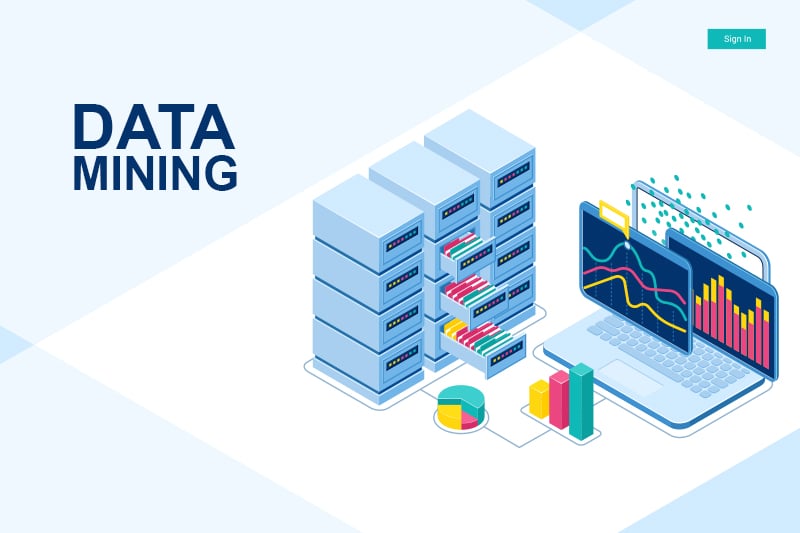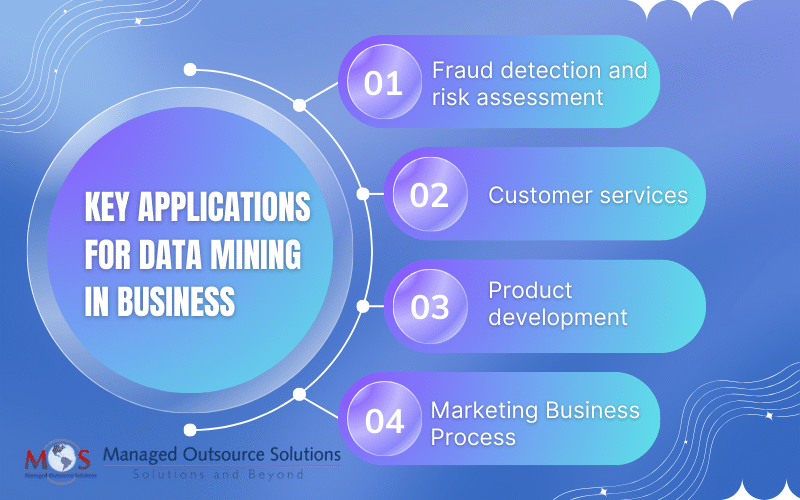The emergence of global organizations such as MNCs in the world market generates data at an accelerating pace, enabling unique opportunities for business growth. In information analytics and business intelligence, data mining is a robust, versatile technique for transforming raw data into actionable insights. Corporations use it to extract valuable information that serves as a tool to enhance business functionality, streamline administrative tasks, and drive financial growth. Whether it involves improving customer satisfaction, discovering hidden hazards, or taking better-informed decisions, data mining is crucial to achieving business goals and objectives. By outsourcing to a provider of data mining services, companies can discover hidden potential and make business decisions that maximize revenue flow.
What Is Data Mining?
Data mining, also known as Knowledge Discovery in Databases (KDD), refers to the technical process of cleaning through the vast accumulation of raw data sets to extract useful information for organizations. It involves harnessing the capabilities of artificial intelligence, statistical analysis, and database systems to turn data into practical knowledge. The goal of data mining tools employed for this process is to uncover hidden patterns, correlations, and anomalies present in this raw data and transform it into an organized format.
The various phases of the KDD process include the following steps:
- Business understanding
- Data understanding
- Data preparation
- Modeling
- Evaluation
- Deployment
Importance of Data Mining in Business
Data mining assists businesses in streamlining various operational tasks and making better evidence-driven business strategies. Multiple industries use KDD to extract valuable insights for accurate predictions, market research, and identify improvement opportunities.
Let us cover various applications of KDD in business, such as:
- Fraud Detection and Risk Assessment
Traditional fraud detection methods such as rule-based systems and manual processes are not well-equipped to manage complex amounts of information in this digital age. Data mining has revolutionized with the entry of machine learning and AI to process vast amounts of datasets and flag potential frauds. Businesses can use past information for predictive modeling to forecast previously unseen fraudulent activities and mitigate sophisticated fraud schemes.
Companies can also use it for faster and more accurate identification of key risk factors and determine its scale to mitigate oversights or threats. Industries such as legal and finance fields can utilize KDD to verify customer background, prevent money laundering, and reduce revenue loss.
- Customer Services
In services industries, data mining can help improve customer experience with the quantifiable consumer information pulled and analyzed from various data sources. Companies can use this information to identify customer behavior, pattern trends, and conduct sentiment analysis. Through accurate data models, brands can strategize their product campaign, amend production quantity, and implement efficient supply chains. It enables them to improve the overall quality of customer service and address customer concerns quickly.
- Product Development
Mining data can help companies that design, make, and produce physical products to increase sales and drive revenue growth with a well-planned product development process. By analyzing purchase patterns, sales forecasts, and demographic information for their products, brands can better target market audiences. Segmenting the audience is essential to deliver customized marketing campaigns, personalized recommendations, and tailored customer experiences.
This technology helps companies to do real-time and predictive analysis for demand forecasting, inventory management, and production rates to optimize production schedules. Companies can also enhance operational efficiency by identifying potential resource barriers and stock in advance to avoid last-minute shortages.
- Marketing
KDD is a powerful tool in the marketing field to streamline various campaign activities such as customer segmentation, targeting, and performance tracking. It extracts knowledge from various databases and formulates information for actionable business intelligence. By analyzing consumer demographics, market basket, and customer behavior, companies can create personalized loyalty campaigns.
It enables enterprises to gauge customer sentiment and unearth sales statistics based on metrics such as sales cycle length, sales by area, and sales by channel. This calculation allows managers to study the impact of their marketing strategies and identify productive, successful campaigns. Companies can also scale their sales techniques, such as upselling, cross-selling, and limited offers to realize sales goals.
- Business Process
KDD can boost the overall quality of business processes by streamlining operational functions and improving productivity and efficiency in a company. By centralizing scattered information from various sources into a business intelligence report, this process helps companies to make better business outcomes. Given the high amount of volume, velocity, and variety of large datasets available in this information era, automated KDD tools can generate high-quality, relevant information for actionable business results.
Companies that engage in the KDD process gain a better understanding of customer behavior and financial analysis and flag any potential concerns across departments. Investing in KDD effectively can help companies gain a competitive edge in their fields and discover new potential business opportunities.
Data Mining Techniques in Business Analytics
Data mining uses a vast array of advanced analytical techniques and algorithms to transform large datasets into analyzed results. The most popular type of KDD technique includes:
- Classification – It is a mining technique used to sort datasets into predefined classes or labels based on the features of data instances. It uses methods such as random forest and support vector machines to predict the target class of each new data item according to historical information.
- Clustering –This statistical method is closely related to classification but differs as the grouping of data points is based on similarities. Unlike classification, clustering does not require a target variable, as the goal is to discover natural patterns or behaviors and results in generalized groups where each one is distinct from another.
- Association rules – This process focuses on discovering relationships among two different, apparently unrelated variables in large datasets. It uses if-then statements to reveal associations between different items to demonstrate how often one object influences an action on the other object. In business, it is utilized to find the frequency of products commonly purchased together.
- Regression – This is a mathematical technique used to predict a range of numeric values in various categories based on specific input variables. For example, it can predict optimal product price points based on price threshold, market demand, and competition.
- Decision trees – They are graphical diagrams with flow-type structures used to predict outcomes based on a list of criteria or decisions. Decision trees provide a general framework for businesses to map out a range of feasible options or consequences of their operations, such as a marketing campaign.
The Bottom Line
KDD plays an essential role in transforming raw data into actionable insights, with the power of techniques from statistics, machine learning, and database systems. Several KDD techniques are available that can be tailored to the specific needs and data types of an organization. It can drive data-based decision-making processes, optimize operations, and predict market trends in business. However, KDD is a complex, challenging process that requires unique knowledge and skills, so hiring an outsourcing services provider specializing in data mining is a feasible option for companies to manage their large datasets.





